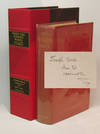
Haj, The
by Leon Uris
- Used
- Fine
- Hardcover
- first
- Condition
- Fine/Good-
- Seller
-
Mulvane, Kansas, United States
Payment Methods Accepted
About This Item
Content appears as new, unopened, unread & unblemished in fine black cloth covered boards with DJ displaying moderate surface/edge wear as shown, with reinforced and repaired chipping & small tears.
We Arabs are the worst. . . ." That is the theme of this crude propaganda-novel by the author of Exodus, which traces the Palestinian-refugee problem up through 1956—blaming 100 percent of it on the British and the Arabs (Arab greed, decadence, laziness, backwardness, bestiality, etc.), putting the case into the mouths of a few relatively "good" Arabs. The title character is Ibrahim, who becomes the young chieftain of the Palestinian village Tabah in 1922. He feels affection for Gideon Asch, the noble Haganah leader who watches over the nearby kibbutz. ("He respected a fairness in Gideon that he was not able to practice himself.") But, culture-bound and constantly threatened by rival Arab leaders, Ibrahim must reject Gideon's offers of aid and friendship. Meanwhile, Ibrahim's youngest son Ishmael—the off-and-on narrator—is growing up during WW II, only half-brainwashed into Koran-based hatred. ("Why can't Islam share the world with other people?") Then, in 1947, comes the Israeli/Arab warfare: Ben-Gurion vows that "under no circumstances will we force out a single Arab"; for tactical, power-ploy reasons, however, the Arabs force the Palestinian villagers to evacuate—while the wealthy "Palestinian Arab leadership simply abandoned its country in a self-serving manner uncaring of the balance of the population." The Arabs spread false rumors of Jewish atrocities to cause mass flight; the women of Ibrahim's family are raped by rival Arab henchmen. And though the family survives, thanks to Gideon and a "very sympathetic" Irgun officer, their arrival in Arab territory on the West Bank is greeted by Arab disdain, neglect, cruelty. ("The Jews have never done to me and my people what has happened. . . at the hands of our own brothers.") They live in a cave, in refugee camps; "we rotted and complained. . . we became overpowered with self-pity." Israel secretly invites the repatriation of 100,000 Arabs—but the Palestinians become the passive, lazy pawns of ambitious Jordanians, Iraqis, and Egyptians: Ibrahim and other moderates are smeared or assassinated; Ibrahim's older son is murdered by Jordan, then turned into a supposed victim of the Zionists, "the first Palestinian martyr." All UN attempts at bettering the refugee situation are ruined by "tribal avarice." And finally, "no longer able to combat or cope with the evils of our society," Ibrahim slips back into primitivism—hating Israel, killing his daughter for abandoning traditional ways—while young Ishmael ends up in despair, knowing that his "culture" is the villain. . . and that "the Arabs alone have the resources to dissolve their refugee problem, if they wanted to." Are there elements of truth in Uris' anti-Arab version of Palestinian history? Unquestionably. Here, however, presented in a blurred fact/fiction format, his arguments come across as grossly biased, untrustworthy, drenched in bigotry. Gratuitous scenes of Arab sex-and-violence are inserted to remind us that this is a "savage people"; generalizations about the Arab "nature" abound. (Similar remarks about blacks or Jews would probably be considered unpublishable.) Furthermore, simply as storytelling, this is a sad comedown for veteran Uris: the narration is rudimentary, often clumsy; the dialogue is amateurish, riddled with anachronisms; flat little history-lessons are thrown in haphazardly; and there's no real characterization—just illustrations of the defects in Arab culture. In sum: a dreary, ugly lecture/ novel—sure to attract an audience, but likely to embarrass all but the most unthinking Jewish readers.
Shipping/Handling/Insurance/Tracking Included within the continental U.S. (Free Shipping). Extra Charges/Fees apply on Shipments Outside The U.S. and Expedited Shipments. Oversize and/or heavy books may require additional fees. Will advise. Written 8.22.2021SK #5375-82421 Img. 6619 8.24.21
Reviews
(Log in or Create an Account first!)
Details
- Bookseller
- Eve's Reads
(US)
- Bookseller's Inventory #
- 5375-82421
- Title
- Haj, The
- Author
- Leon Uris
- Book Condition
- Used - Fine
- Jacket Condition
- Good-
- Quantity Available
- 1
- Edition
- 1st Edition (After A Privately Printed Signed Limited Edition)
- Binding
- Hardcover
- Publisher
- Doubleday & Co., Inc.
- Place of Publication
- Garden City, NY
- Date Published
- 1984
- Pages
- 366
- Weight
- 0.00 lbs
- Keywords
- Fiction
Terms of Sale
Eve's Reads
Shipping/Handling/Insurance/Tracking Included within the continental U.S. (Free Shipping). Extra Charges/Fees apply on ALL Shipments Outside The U.S. and Expedited Shipments. Oversize and/or heavy books require additional fees. Will advise and will send invoice via Paypal for extra charges.
About the Seller
Eve's Reads
About Eve's Reads
Glossary
Some terminology that may be used in this description includes:
- Fine
- A book in fine condition exhibits no flaws. A fine condition book closely approaches As New condition, but may lack the...
- Unopened
- A state in which all or some of the pages of a book have not been separated from the adjacent pages, caused by a traditional...
- Chipping
- A defect in which small pieces are missing from the edges; fraying or small pieces of paper missing the edge of a paperback, or...
- New
- A new book is a book previously not circulated to a buyer. Although a new book is typically free of any faults or defects, "new"...
- Cloth
- "Cloth-bound" generally refers to a hardcover book with cloth covering the outside of the book covers. The cloth is stretched...

